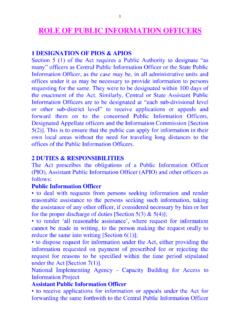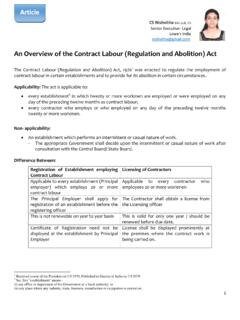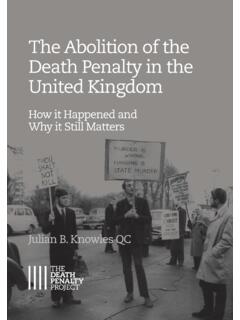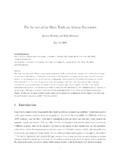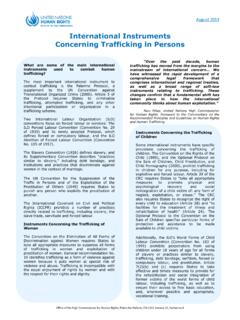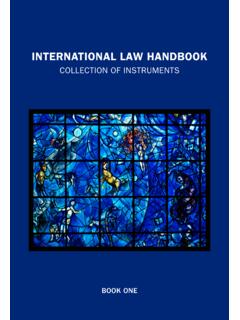Transcription of CONTRACT LABOUR (REGULATION AND ABOLITION) ACT, …
1 CONTRACT LABOUR (REGULATION AND abolition ) ACT, 1970 CHAPTER I: PRELIMINARY1. Short title, extent, commencement and application2. DefinitionsCHAPTER II: THE ADVISORY BOARDS3. Central Advisory Board4. State Advisory Board5. Power to constitute committeesCHAPTER III: REGISTRATION OF ESTABLISHMENTS EMPLOYING CONTRACT LABOUR6. Appointment of registering officers7. Registration of certain establishments8. Revocation of registration in certain cases9. Effect of non-registration10. Prohibition of employment of CONTRACT labourCHAPTER IV: LICENSING OF CONTRACTORS11. Appointment of licensing officers12. Licensing of contractors13. Grant of licences14. Revocation, suspension and amendment of licences15. AppealCHAPTER V: WELFARE AND HEALTH OF CONTRACT LABOUR16.
2 Canteens17. Rest-rooms18. Other facilities19. First-aid facilities20. Liability of principal employer in certain cases21. Responsibility for payment of wagesCHAPTER VI: PENALTIES AND PROCEDURE22. Obstructions23. Contravention of provisions regarding employment of CONTRACT labour24. Other offences25. Offences by companies26. Cognizance of offences27. Limitation of prosecutionsCHAPTER VII: MISCELLANEOUS28. Inspecting staff29. Registers and other records to be maintained30. Effect of laws and agreements inconsistent with this Act31. Power to exempt in special cases32. Protection of action taken under this Act33. Power to give directions34. Power to remove difficulties35. Power to make rulesFoot NotesAct No.
3 37 of Year 1970, dated 5th. September, 1970An Act to regulate the employment of CONTRACT LABOUR in certain establishments and to provide forits abolition in certain circumstances and for matters connected therewithBe it enacted by Parliament in the Twenty-first Year of the Republic of India as follows: - CHAPTER I: PRELIMINARY1. Short title, extent, commencement and application(1) This Act may be called the CONTRACT LABOUR (Regulation and abolition ) Act, 1970(2) It extends to the whole of India.(3) It shall come into force on such date as the Central Government may, by notification in theOfficial Gazette, appoint and different dates may be appointed for different provisions of this Act.(4) It applies-(a) to every establishment in which twenty or more workmen are employed or were employed onany day of the preceding twelve months as CONTRACT LABOUR ;(b) to every contractor who employs or who employed on any day of the preceding twelve monthstwenty or more workmen:PROVIDED that the appropriate government may, after giving not less than two months notice ofits intention so to do, by notification in the Official Gazette, apply the provisions of this Act to anyestablishment or contractor employing such number of workmen less than twenty as may bespecified in the notification.
4 (5) (a) It shall not apply to establishments in which work only of an intermittent or casual nature isperformed.(b) If a question arises whether work performed in an establishment is of an intermittent or casualnature, the appropriate government shall decide the question after consultation with the CentralBoard or, as the case may be, as State Board, and its decision shall be : For the purpose of this sub-section, work performed in an establishment shall not bedeemed to be of an intermittent nature-(i) if it was performed for more than one hundred and twenty days in the preceding twelve months,or(ii) if it is of a seasonal character and is performed for more than sixty days in a Definitions(1) In this Act, unless the context otherwise requires,-1[(a) appropriate government means-(i) in relation to an establishment in respect of which the appropriate government under theIndustrial Disputes Act, 1947 (14 of 1947), is the Central Government, the Central Government.]
5 (ii) in relation to any other establishment, the Government of the State in which that otherestablishment is situate;](b) a workman shall be deemed to be employed as CONTRACT LABOUR in or in connection with thework of an establishment when he is hired in or in connection with such work by or through acontractor, with or without the knowledge of the principal employer;(c) contractor , in relation to an establishment, means a person who undertakes to produce a givenresult for the establishment, other than a mere supply of goods or articles of manufacture to suchestablishment, through CONTRACT LABOUR or who supplies CONTRACT LABOUR for any work of theestablishment and includes a sub-contractor;(d) controlled industry means any industry the control of which by the Union has been declaredby any Central Act to be expedient in the public interest;(e) establishment means-(i) any office or department of the government or a local authority, or(ii) any place where any industry, trade, business, manufacture or occupation is carried on.
6 (f) prescribed means prescribed by rules made under this Act;(g) principal employer means-(i) in relation to any office or department of the government or a local authority, the head of thatoffice or department or such other officer as the government or the local authority; as the case maybe, may specify in this behalf,(ii) in a factory, the owner or occupier of the factory and where a person has been named as themanager of the factory under the Factories Act, 1948 (63 of 1948), the person so named.(iii) in a mine, the owner or agent of the mine and where a person has been named as the manager ofthe mine, the person so named,(iv) in any other establishment, any person responsible for the supervision and control of : For the purpose of sub-clause (iii) of this clause, the expressions mine , owner and agent shall have the meanings respectively assigned to them in clause (j) clause (l) and clause (c) of sub-section (1) of section 2 of the Mine Act, 1952 (35 of 1952);(h) wages shall have the meaning assigned to it in clause (vi) of section 2 of the Payment ofWages Act, 1936 (4 of 1936).
7 (i) workman means any person employed in or in connection with the work of any establishmentto do any skilled, semi-skilled or unskilled manual, supervisory, technical or clerical work for hireor reward, whether the terms of employment be express or implied, but does not include any suchperson-(A) who is employed mainly in a managerial or administrative capacity; or(B) who, being employed in a supervisory capacity draws wages exceeding five hundred rupees per mensem or exercises, either by the nature of the duties attached to the office or by reason of thepowers vested in him, functions mainly of a managerial nature; or(C) who is an out-worker, that is to say, a person to whom any article and materials are given out byor on behalf of the principal employer to be made up, cleaned, washed, altered, ornamented,finished, repaired, adapted or otherwise processed for sale for the purposes of the trade or businessof the principal employer and the process is to be carried out either in the home of the out-worker orin some other premises, not being premises under the control and management of the principalemployer.
8 (2) Any reference in this Act to a law which is not in force in the State of Jammu and Kashmir shall,in relation to that State, be construed as a reference to the corresponding law, if any, in force in II: THE ADVISORY BOARDS3. Central Advisory Board(1) The Central Government shall, as soon as may be, constitute a Board to be called the CentralAdvisory CONTRACT LABOUR Board (hereinafter referred to as the Central Board) to advise the Central Government on such matter arising out of the administration of this Act as may be referred to it andto carry out other functions assigned to it under this Act.(2) The Central Board shall consist of-(a) a Chairman to be appointed by the Central Government;(b) the Chief LABOUR Commissioner (Central), ex officio;(c) such number of members, not exceeding seventeen but not less than eleven, as the CentralGovernment may nominate to represent that government, the Railways, the coal industry, themining industry, the contractors, the workmen and any other interests which, in the opinion of theCentral Government, ought to be represented on the Central Board.
9 (3) The number of persons to be appointed as members from each of the categories specified insub-section (2), the term of office and other conditions of service of, the procedure to be followed in the discharge of their functions by, and the manner of filling vacancies among, the members of theCentral Board shall be such as may be prescribed:PROVIDED that the number of members nominated to represent the workmen shall not be less than the number of members nominated to represent the principal employers and the State Advisory Board(1) The State Government may constitute a Board to be called the State Advisory CONTRACT LabourBoard (hereinafter referred to as the State Board) to advise the State Government on such mattersarising out of the administration of this Act as may be referred to it and to carry out other functionsassigned to it under this Act.
10 (2) The State board shall consist of-(a) a Chairman to be appointed by the State Government;(b) the LABOUR Commissioner, ex officio, or in his absence any other officer nominated by the StateGovernment in that behalf;(c) such number of members, not exceeding eleven but not less than nine, as the State Governmentmay nominate to represent that government, the industry, the contractors, the workmen and anyother interests which, in the opinion of the State Government, ought to be represented on the StateBoard.(3) The number of persons to be appointed as members from each of the categories specified insub-section (2), the term of office and other conditions of service of, the procedure to be followed in the discharge of their functions by, and the manner of filling vacancies, among, the members of theState Board shall be such as may be prescribed:PROVIDED that the number of members nominated to represent the workmen shall not be less than the number of members nominated to represent the principal employers and the Power to constitute committees(1) The Central Board or the State Board, as the case may be, may constitute such committees andfor such purpose or purposes as it may think fit.
